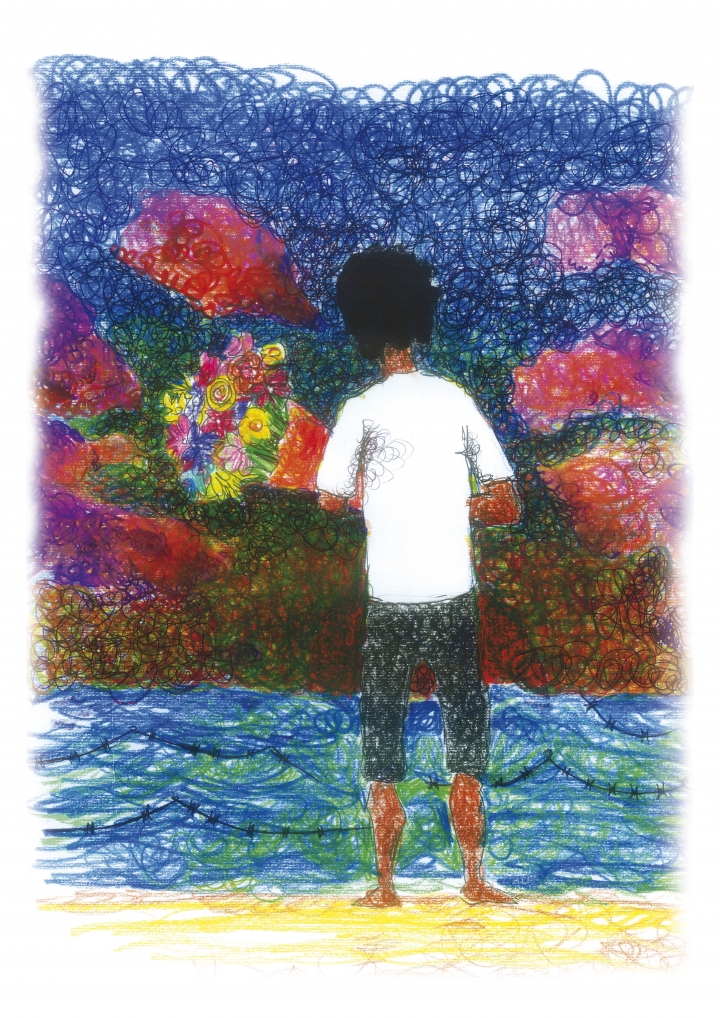
Story:
Putting flowers on a loved one’s grave is one way to say, “I love you. I miss you. I remember you.”
Francesco Piobbichi’s drawing gives us a brief glimpse into a young boy’s grief. The boy stands at the edge of the Mediterranean Sea, which has become a mass grave for over 35,000 refugees in the last decade. The statistic is staggering, yet this glimpse into one young boy’s grief has the power to move us in ways that statistics do not. It makes us wonder who he lost—who he misses—who he remembers. And it may even make us wonder, “What can I do to help?”
Francesco Piobbichi is a relief worker with Mediterranean Hope—and organization that seeks to save and welcome refugees trying to make their way across the Mediterranean. One of the ways Piobbichi has answered the question, “What can I do to help?” is by reminding us that each statistic has a story. He describes it this way: “My drawings tell a story that otherwise would be consigned to the oblivion of the sea” (Drawings from the Border, p. vi).
Bible Reading: Psalm 72:12-14 (NRSV)
Psalm 72 is a prayer. In fact, it may be a prayer written by King David for his son and successor, Solomon. Yet, the author of the prayer is not as remarkable as its values. Verses 12-14 cut straight to the heart what makes a good ruler. They may not be what we expect.
For he delivers the needy when they call, the poor and those who have no helper.
He has pity on the weak and the needy, and saves the lives of the needy.
From oppression and violence he redeems their life;
And precious is their blood in his sight.
Mahatma Ghandi once observed that, “A nation’s greatness is measured by how it treats its weakest members.” Psalm 72 seems to have a similar score card for political leaders.
In the caption for his drawing of the young boy with the flowers, Francesco Piobbichi suggests that we place a flower “for all the victims of this barbed sea made murderous by the selfishness of [human beings], from the hunger [for] profit that upsets the world…a flower for every innocent victim of this war of the rich against the poor” (Drawings from the Border, p. 55).
Discussion/Reflection:
- How would you grade your leaders against the rubric of Psalm 72? Why?
- Why is it so hard to respond to a statistic like the one cited in the story above? Was the 35,000 number a surprise to you?
- How do you respond to Piobbichi’s words about selfishness, profit, and “this war of the rich against the poor”?
Action:
- Listen to this story from NPR’s Morning Edition from June 7, 2024 about President Biden’s asylum restrictions, and this story, also from NPR on June 18, 2024, “Biden’s plan will shield undocumented spouses of US citizens from deportation.” How would you grade these policies against the rubric of Psalm 72:12-14?
- Read and respond to this March 19, 2024 story by Maic D’Agostino: “As migrants from ‘all over the world’ enter U.S., churches must go to meet them, says Arizona pastor.”
Prayer: Help us to hold our leaders accountable, O God. Give us the courage to imagine the stories behind the statistics.
